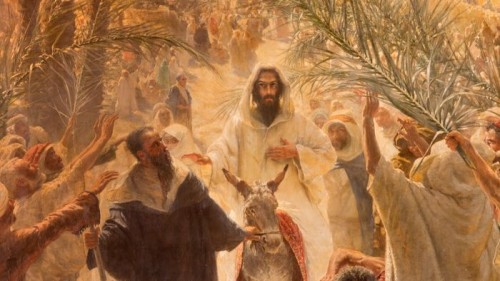
When Jesus entered Jerusalem, it was a big deal. The city was packed with pilgrims who had come to celebrate the Passover. The occupying Roman army was on high alert, well-aware that insurrection was common during the days of the festival. The air was electric as devout Jews from across the diaspora gathered together in the city of David to remember their liberation from Egypt, and to wait for God to send another leader like Moses, one who would free them from the Roman yoke.
There was revolutionary expectation as Jesus rode into Jerusalem on a donkey, echoing Zechariah’s prophecy of a victorious messiah-king who would free Israel from foreign domination. People waved palm branches and threw down their coats in front of Jesus, reenacting the anointing of Jewish kings. They shouted praise: “Blessed is the king who comes in the name of the Lord!” All of Jerusalem was abuzz with the question: Could this Jesus be the one? Could he be the promised savior who would defeat the Romans and establish an independent Jewish state?
Jesus didn’t seem to deny that interpretation. When some of the Pharisees in the crowd demanded that he calm his disciples, Jesus only replied: “I tell you, if these were silent, the stones would shout out.”
Yet Jesus saw something that no one else did. All the crowds around him were imagining what the future might hold for Israel. But Jesus didn’t imagine – he knew. With the eyes of a prophet, Jesus could see what was on the horizon. And all he saw was terror and bloodshed.
Looking down from the Mount of Olives at the holy city, he cried out, weeping: “If you, even you, had only recognized on this day the things that make for peace! But now they are hidden from your eyes.” Jesus could see what the crowds, the Pharisees, and even his own disciples could not: Jerusalem would be besieged, burned, destroyed. The people within it would be annihilated. The dream of violent revolution would become a nightmare. The myth of a Davidic kingdom and a holy Temple would be replaced by utter destruction.
Jesus’ followers had no idea what kind of king they were dealing with. His coronation would take place while hanging from a Roman cross. His crown would be made of thorns. His triumph would be total defeat in the eyes of the world.
In Jesus we discover a ruler whose power comes not from terror and violence, but from self-sacrifice and love. His is a kingdom where the highest ranking people are the outcasts and misfits – the lowest rungs of Caesar’s order. Jesus brings a peace that relies not on legions and imperial occupation, but on radical acts of truth-telling and compassion.
But no one could see that then. Even for Jesus’ closest friends, the kind of leadership that he offered was literally unimaginable.
For most of us, most of the time, it still is. As those of us in the United States find ourselves in the midst of the most contentious, disturbing political season in at least a generation, it’s easy to get scared. It’s tempting to place our hopes in the Caesars and Davids of our time, rather than in the humble way of Jesus that overcomes the politics of Empire. It’s easier to seek comfort from the power of political victory in the world’s terms, rather than entrusting our lives to the lordship of Jesus.
Precisely in times like these, we are invited to stand with Jesus on the Mount of Olives, overlooking the holy city. With the Spirit he gives to us, we can see what he sees. We can perceive the destruction that is coming – and also the transformation and redemption that is possible, even in the face of so much brokenness, violence, and despair. And we can weep with him. Sometimes, tears are the right response.
For all of us who choose to walk in the way of Jesus, we know that crucifixion is coming, but there’s also resurrection. There is darkness all around us, but we have been given power to be the light. We live in a time of confusion, fear, and hatred, but the Spirit of Jesus has given us a bold love to stand in. It’s there waiting for each of us. Will we recognize our time of visitation from God?